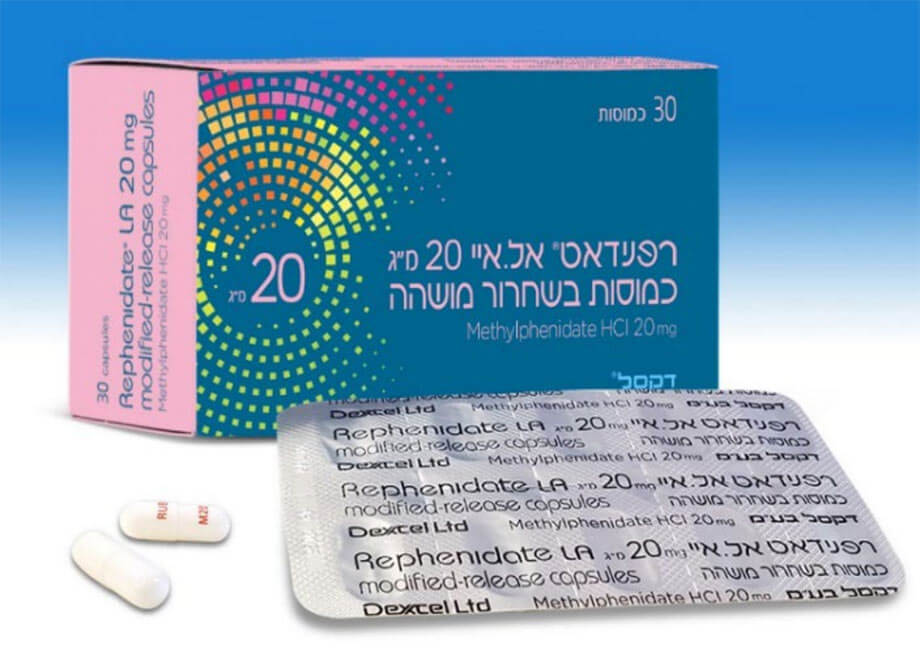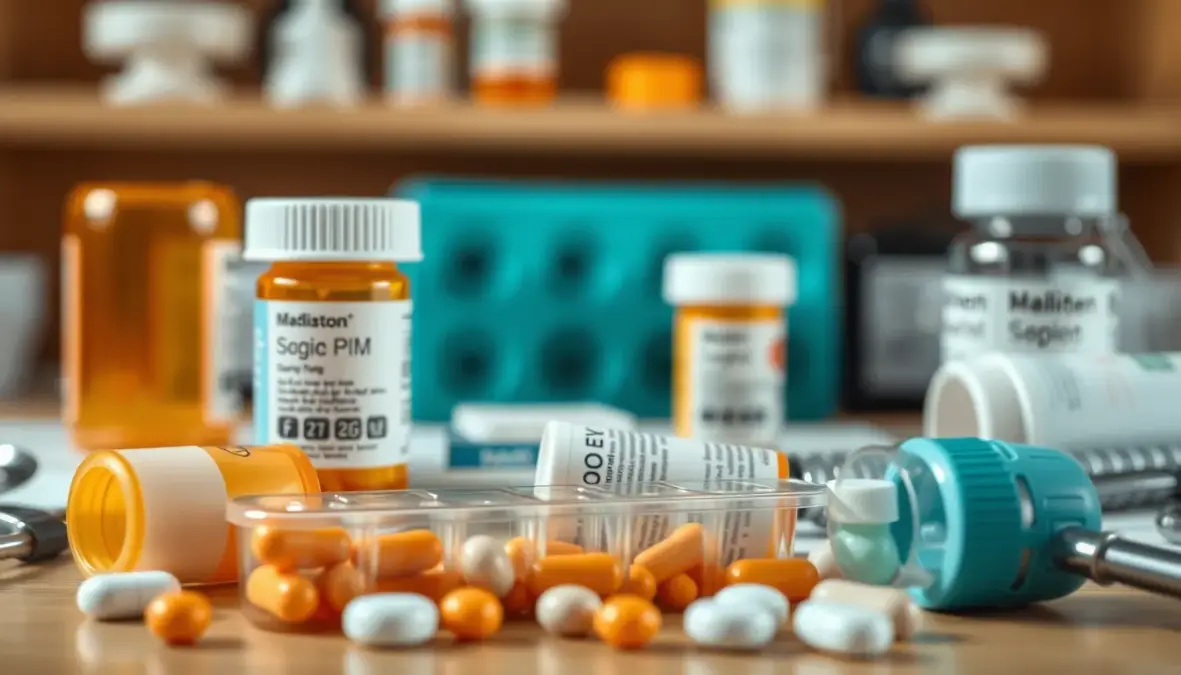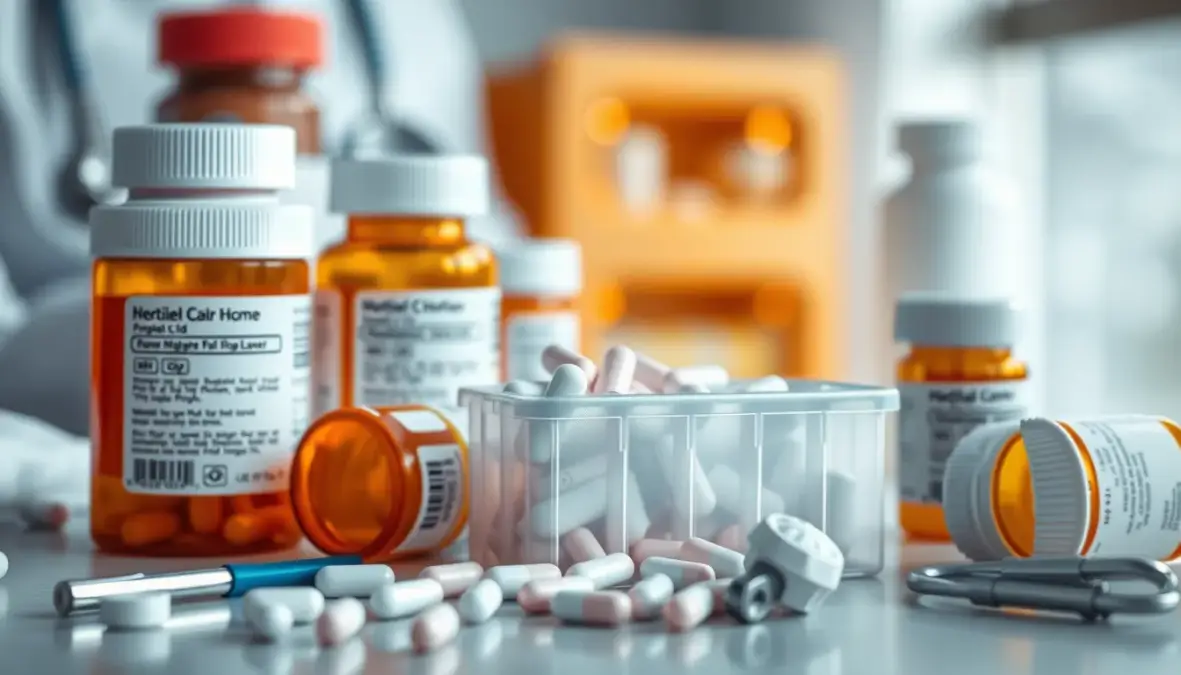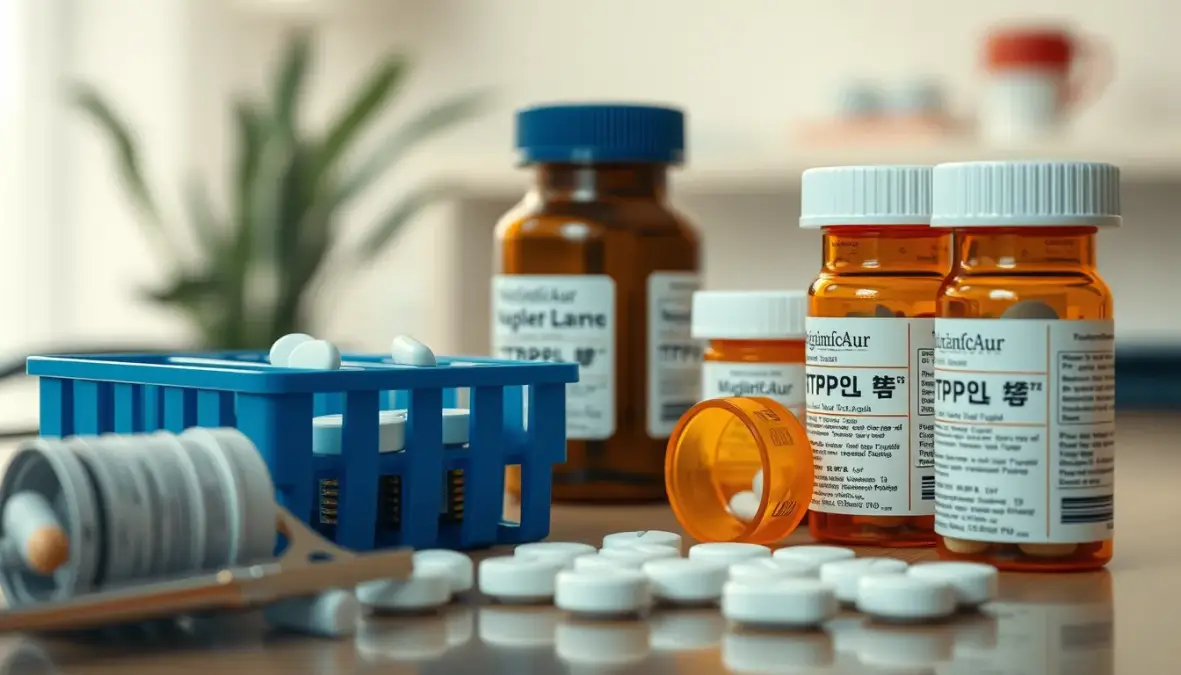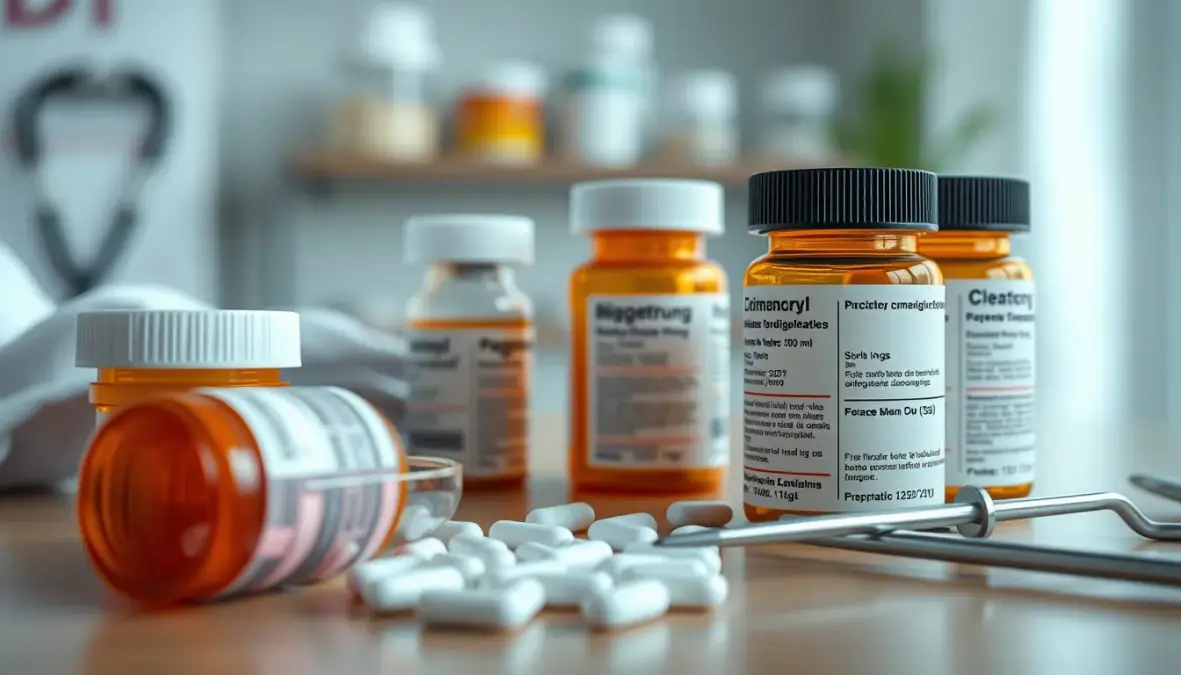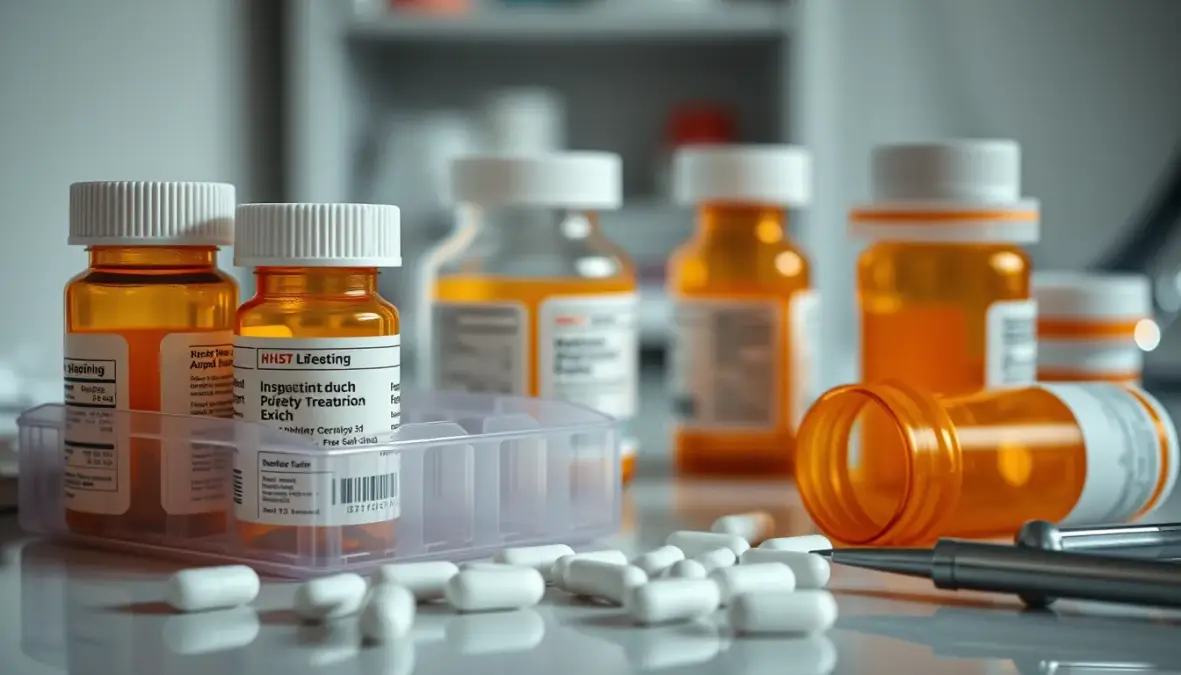Rapinidate is one of the treatments that may help people with attention deficit hyperactivity disorder (ADHD) or similar neurological conditions. It is a medication that is designed to improve concentration, moderate attention fluctuations, and help with daily organization. In this article, we will review all the relevant information: what are the main uses, how to take Rafnidate, what are the recommended doses, what are the possible side effects, how long does Rafnidate take to take effect, and a wide variety of important aspects. This information will help you get a comprehensive picture of the situation before you consult your doctor.
This article is written in both accessible and professional language. Along with the medical highlights, we will also incorporate practical recommendations and points for thought from the experiences of both doctors and patients. The purpose of the text is to provide answers to key questions about the drug, help you better understand the advantages and disadvantages, and highlight points that are worth considering when using it.
General background on rafinidate
Rephenidate belongs to a group of stimulants, which are mainly used to treat attention deficit hyperactivity disorder (ADHD) and various associated conditions. The drug acts on the central nervous system and affects dopamine and noradrenaline levels in the brain. This can improve concentration, increase motivation, and reduce distractions.
Its use is most common among children, adolescents, and adults with ADHD. However, it may also be given in other cases, when the doctor sees it as an appropriate tool to improve the patient's condition. If you or your child is diagnosed with attention deficit disorder, it is worth considering with your doctor whether Rafenidate is a relevant solution.
Before starting treatment with rafenidate, it is recommended to understand its various characteristics: how it works, the types of doses, and the ways in which the drug can be taken. Furthermore, it is important to plan ongoing monitoring of the body's reactions, in order to identify benefits or problems and change the dosage if necessary.
How does the medicine work?
Rafinidate is designed to affect the neural pathways in the brain associated with attention and self-control. In general, it increases the flow and concentration of neurotransmitters, such as dopamine and norepinephrine. By altering these chemical relationships, the drug can improve focus and promote calmness and alertness while performing tasks.
The mechanism of action is similar to other stimulant drugs in the same category, but each preparation has a unique profile of effects and side effects. In some cases, the effects of rapenidate will be felt within a short time of taking it. However, it should be remembered that each patient's experience of the effects may be different, so it is important to monitor personal feelings over time.
Usually, treatment is started at a low dose to test the body's response, and then the dose is gradually increased until a satisfactory therapeutic effect is achieved, while monitoring possible side effects.
Types and formulations: rephenidate 10, rephenidate 10 mg and more
This medication is available in several dosage forms (tablets or capsules) and they differ in their release rate and dosage. It is important to be familiar with some of the main versions:
-
Rapinidate 10: 10 mg tablets, also known as rephenidate 10 mg. They are usually immediate-release, so the effect begins within a relatively short period of time.
-
rephenidate 10: Another name for the same 10 mg dosage version, which is sometimes the initial dose for new patients.
-
rephenidate la: A long-acting version, intended for those who need treatment throughout the day. More precisely: Rafinidate LA contains 50% of the active ingredient in immediate release, and the remaining 50% is released in a delayed manner after about 4 hours. This configuration allows for a prolonged effect of about 8 hours and reduces the need for multiple doses throughout the day.
-
rephenidate tab 10mg: It is also a version equivalent to the 10 mg dose, in which the tablets are immediately released.
-
Other dosages: Besides 10 mg, there are a variety of other dosages that may be appropriate according to age, weight, and professional consultation with the doctor.
Doctors choose the type of dosage based on the patient's lifestyle, the number of hours they need to improve concentration, and their body's tolerance. Some people need an extended-release to help during a long school or work day, while others are satisfied with a precise, rapid-release dose before a specific task.
How to take Rafinidat correctly
Rafinidat should be taken only as directed by your doctor. However, there are a few general principles that may be helpful:
-
Timing of takingIt is recommended to take the medication early in the morning, before starting daily activities. This way, you can get the most benefit from it throughout the day and avoid sleep disturbances.
-
With or without food: Some people prefer to take rafenidate on a full stomach to reduce gastrointestinal side effects. Others find that taking it on an empty stomach works faster. It is worth experimenting carefully and seeing what works for you.
-
Regularity and routineTaking the medication at the same time each day helps maintain a consistent blood level and maximizes its effect.
-
Avoiding uncontrolled mixing: It is advisable not to mix different rafenidate preparations without medical approval. Also, do not change the dosage without first consulting your doctor.
-
Extended-release tablets: If you choose rephenidate LA or a similar preparation, do not crush or chew the capsule. Chewing changes the release rate and may cause an unexpected or overly strong effect.
It is important to understand that these guidelines are general. Your doctor may give specific instructions based on your medical condition, age, weight, or personal sensitivities. Regular follow-up and coordination of expectations are invaluable in the success of your treatment.
Recommended dosages and general guidelines
The dosage of Rafenidate depends on various factors, such as age, weight, severity of symptoms, and the body's response to treatment. The following are common principles, but they should not be considered a substitute for medical consultation:
-
Common starting dose: 5–10 mg per day, usually in the morning.
-
Gradual increase: The doctor may increase the dose after a specified period of time, based on the patient's response. Sometimes it reaches 20 mg or more per day, divided into several doses.
-
Maximum doseDoctors sometimes limit the dosage to about 60 mg per day in certain cases, but this depends on their professional judgment.
-
Child careChildren and adolescents may receive a lower dose, with emphasis on monitoring growth and development.
-
Initiated breaks: Some patients take a "medication holiday" on weekends or long vacations, to reduce the cumulative effect and test the need for the medication.
The overall recommendation is to work closely with your doctor or pharmacist. Each medication has a different profile and varied response characteristics, so close monitoring allows for necessary adjustments to be made.
Common side effects and what to do in case of a side effect
Like any medication, Rapinidate has possible side effects. Not every patient will experience all of them, but it is important to know the main ones:
-
Nervous system effects: Irritability, anxiety, difficulty sleeping, and headaches. In some cases, a feeling of sadness or mild depression may also occur, but this requires close medical monitoring.
-
Gastrointestinal symptoms: Decreased appetite, stomach pain, or nausea. Drinking plenty of water and eating a balanced diet can help reduce some of these symptoms.
-
Change in mood: Some people report fluctuations in emotions. If this interferes with daily functioning, professional advice should be sought.
-
Pulse and blood pressure: Because the drug is a stimulant, it may temporarily increase heart rate and blood pressure. Pre-existing heart and blood vessel health conditions require caution and prior evaluation.
-
Sleep disorders: Taking it late in the day may cause difficulty falling asleep or persistent sleep problems.
As you can see, common side effects are irritability, anxiety, difficulty sleeping, and headaches. In addition, symptoms such as decreased appetite, nausea, dizziness, dry mouth, and rapid heartbeat may occur. When a serious or bothersome side effect occurs, it is recommended to consult a doctor as soon as possible. Sometimes adjusting the dosage or switching to an extended-release preparation can reduce the symptoms. There are also situations in which it is better to stop treatment – this is of course only under the guidance of a doctor.
How long does it take for Rapinidate to actually take effect?
A common question among patients is: How long does it take for Rapinidate to take effect from the moment it is taken? The answer depends on the type of medical preparation (immediate or extended release) and the patient's characteristics.
-
Immediate Release: The effect can usually begin within 30–60 minutes and last for 3–4 hours. This is why some people take several doses throughout the day.
-
Extended Release (LA): Here the effect may begin in a similar range, but lasts longer – sometimes 6–8 hours or even longer.
-
Personal differences: Some patients feel the onset of the effect immediately, while others feel consistent improvement only after about a week of regular use.
It is important to pay attention to changes throughout the day. If the effect wears off too soon, your doctor may recommend some adjustment – whether in dosage, form of release, or time of taking.
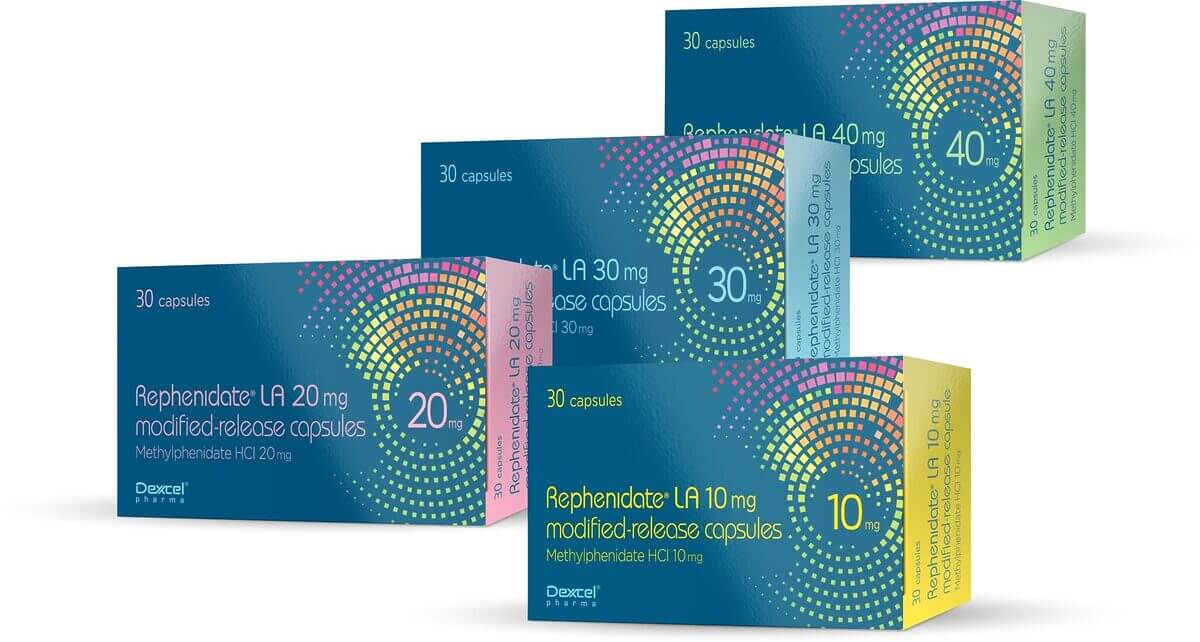
Differences between Rafenidate and other drugs
Rafenidate is not the only medication on the market for treating ADHD. There are other medications, such as methylphenidate and dexamphetamine. Although the mechanism is similar (increasing neurotransmitter levels), each medication has a unique profile of effects, side effects, and rate of action.
Some patients respond better to Rapinidate, while others prefer methylphenidate or amphetamine preparations due to the type of effect. Also, different people may suffer more or less from certain side effects. Therefore, in cases where one drug is not suitable, the doctor may suggest a replacement with another similar drug.
Personal adjustments and medical monitoring
When it comes to medication for ADHD, there is no one-size-fits-all “recipe.” Individualization is especially important because our brains are complex and respond uniquely to each chemical. ADHD can also vary based on age, lifestyle, and daily needs.
-
Dose adjustment: The doctor examines the clinical response – whether there is improvement, whether there are side effects, whether concentration is maintained throughout the day – and accordingly decides to increase or decrease the dosage.
-
Reference to related factors: If there are other emotional problems (such as anxiety or depression), it may be necessary to combine additional treatment or reduce the dosage to prevent worsening.
-
Monitoring medical indicatorsBlood pressure, pulse, and body weight are sometimes checked regularly to identify abnormal changes.
-
Change in the type of medication: If a patient appears to respond better to the extended-release version, it is easier to maintain a consistent daily routine. If a precise and specific effect is required, immediate release is sometimes preferred.
To get the most out of your treatment, it's best to work closely with your doctor and pay attention to your body's signals. Factors such as diet, exercise, and mental state can affect how the medication works.
The importance of professional diagnosis before use
Adapting treatment for attention deficit disorder requires a thorough professional diagnosis. Do not rely solely on general feelings or comparisons to friends or family members. Diagnosis of ADHD (or similar disorders) should be made by a specialist, such as a psychiatrist or neurologist specializing in the field, and sometimes in collaboration with a multidisciplinary team (psychologists, child development experts, etc.).
The comprehensive diagnosis can include:
-
Filling out assessment and medical history questionnaires.
-
Reports from the patient and his family about daily difficulties.
-
Medical tests to rule out other causes.
-
Experiment with low-dose stimulant medications under medical supervision.
Without proper diagnosis, a situation may arise in which a medication is prescribed that does not meet the patient's true needs. Furthermore, incorrect treatment can mask other problems that require attention.
Dealing with stigmas and concerns
Many people hesitate to start medication due to fear of addiction or unknown side effects. In addition, there is a lot of social stigma surrounding the use of stimulant medications. However, it is worth remembering:
-
Attention deficit hyperactivity disorder is a medical condition in every sense of the word. Medications like Rafinidate are a tool that can improve quality of life and lead to success in school, work, and relationships.
-
Many studies demonstrate that drug treatment, combined with educational support and adjustments, may lead to significant improvement in functioning and overall well-being.
-
Medication is not a "magic bullet," but rather part of a broader treatment plan. It is often recommended to combine behavioral tools, personal training (coaching), emotional or psychological therapy, and other approaches.
-
With proper monitoring and at the appropriate dosage, treatment with rafenidate should not create severe physiological dependence. However, the doctor's instructions should be followed, especially if there is a history of addiction or uncontrolled use of stimulants.
If concerns arise, it is a good idea to talk to an expert in the field, get professional information from reliable sources, and remain open to criticism and questions. Knowledge can reduce fears and help you make informed decisions.
Tips for everyday life alongside treatment
Treatment with rafinidate helps regulate and improve concentration, but there are complementary actions that can optimize the drug's effect:
-
Time management and advance planning: Using a calendar, schedule, or task management apps helps you get more prepared for the day and its tasks.
-
Initiated breaks: It is important to incorporate short breaks every hour or two to avoid mental and physical strain.
-
Physical activity: Light exercise on a daily basis may improve mood and contribute to better blood flow in the brain, thus also supporting the effect of the medication.
-
Balanced diet: It is worth maintaining a diet rich in proteins, vitamins, and minerals. This helps maintain a stable energy level throughout the day.
-
Relaxation and stress management techniquesMeditation, yoga, or deep breathing can reduce anxiety and make it easier to deal with stressful situations.
-
Family and environmental involvementWhen the immediate environment is aware of the needs and limitations, it is possible to create alignment of expectations and facilitate the adaptation process.
Of course, each person will find the right approach for them. The main idea is to combine medication with practical tools to improve functioning and daily coping.
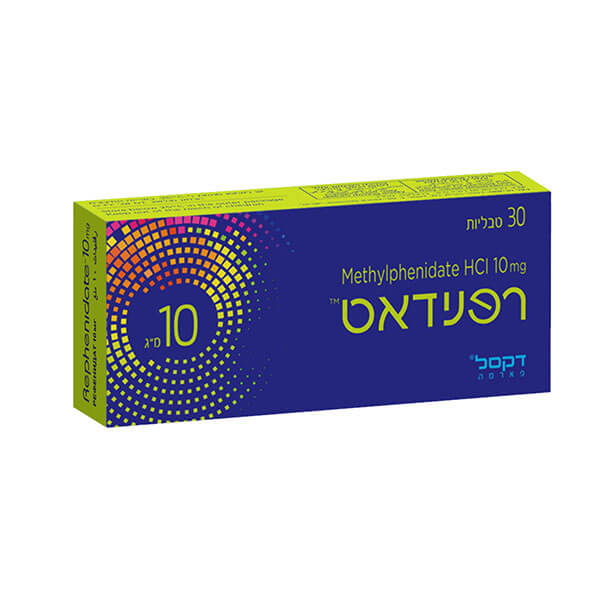
Interactions with drugs and foods
Before starting treatment, it is a good idea to inform your doctor about all other medications you are taking – including vitamins, supplements, and natural treatments. Rafinidate may affect or be affected by various substances, including:
-
Psychiatric medications Others, such as antidepressants or anti-anxiety medications.
-
Antacids to the digestive system, which may change the rate of absorption.
-
Stimulants Additional, such as high amounts of caffeine (coffee, energy drinks).
-
Substances that affect blood pressure and heart rate, such as beta-blockers.
As for food, there are usually no significant restrictions, but it is advisable to avoid excess caffeine and sugary drinks, which may increase irritability. Also, heavy meals may affect the rate of absorption of the medication.
Warnings and contraindications
Despite its effectiveness, there are cases in which Rafenidate is not appropriate, or should be used with extreme caution:
-
Sensitivity to the active ingredient: If there is a known allergy, it is mandatory to avoid use or consult a doctor about alternatives.
-
History of heart disease: The drug may increase heart rate and blood pressure, and therefore requires close monitoring if you have heart disease or high blood pressure.
-
Severe mental disorders: In cases of psychosis, schizophrenia, or major depression, the medication may worsen the condition or disrupt the balance.
-
Extremely young age: Use in children under the recommended age requires special consideration and a comprehensive examination by a professional.
-
Metabolic disorders Or other situations that require consultation: Please read the consumer leaflet and talk to your doctor before starting to take it.
Regular medical monitoring is essential, especially in at-risk populations. You should regularly check in with your doctor, report any changes in your medical condition, and update them on any additional medications you are taking.
Frequently Asked Questions (FAQ)
Can Rafenidate be taken for a long period of time?
Yes, many people use rafenidate for years, under close medical supervision. However, some patients prefer to stop or reduce use at certain times. Continuity and continuation of treatment depend on individual response and doctor's recommendations.
Is Rafinidate addictive?
There is usually no strong physical addiction when the drug is taken according to medical recommendations. However, excessive use or uncontrolled use may cause psychological dependence and requires great caution. It is important to adhere to the prescribed dosage.
Is there a difference between rafenidate and methylphenidate?
Both are drugs with a similar mechanism of action (both are stimulants). Sometimes people experience different reactions to each of them, so choosing the appropriate drug will be based on personal clinical experience and your doctor's recommendations.
What to do if I missed a dose?
If you miss a dose and remember it close to the usual time, you can take the missed dose. However, if a long time has passed or it is already close to the next dose, it is better to skip it to avoid overdose. It is always a good idea to get instructions from your doctor in these cases.
Is it possible to combine behavioral therapy with Rafenidate?
Absolutely. A combination of behavioral therapy, psychological support, or emotional coaching may enhance the benefits of drug treatment. This is a comprehensive, multidisciplinary approach that is now considered very effective.
Summary and a look to the future
Rephenidate has proven to be an effective treatment for a wide range of people with ADHD. It offers significant improvements in concentration and thought organization, with a variety of dosages and formulations available, including Rephenidate 10 and Rephenidate LA extended-release. Furthermore, by following medical instructions, monitoring side effects, and making dosage adjustments, the benefits of the drug can be maximized while minimizing risks.
If you decide to consider Rafinidate, it is important to act wisely. Consult a specialist, provide him with complete information about your medical condition, and monitor the drug's effects regularly. With the right approach, Rafinidate may contribute to improvements in many areas of life.
For more information about medications and health aspects, please visit the website Israeli Ministry of Health or check out publications from The International Association for Attention Deficit Hyperactivity Disorder (CHADD) (Site in English). These are authoritative sources of information that can enrich your understanding of the subject and assist you in making informed decisions in collaboration with your medical team.
Remember, this is a personal and unique process for each person. The combination of precise medication, professional guidance, and complementary tools may contribute greatly to quality of life and successful coping with attention and concentration challenges.

פרופ’ אלון גרין הוא מומחה לפסיכיאטריה קלינית ומחקר תרופתי, עם התמחות בפיתוח והתאמת תרופות מרשם למגוון מצבים נוירו-פסיכיאטריים. בעל ניסיון של למעלה מ־35 שנה בעבודה קלינית ואקדמית, וכיהן כמרצה ופרופסור אורח במספר אוניברסיטאות מובילות בארץ ובחו”ל. עמד בראש יחידות מחקר וטיפול בבתי חולים ציבוריים ומרכזים רפואיים מתקדמים. תחומי עיסוקו כוללים קשב וריכוז (ADHD), הפרעות חרדה והרגעה, דיכאון קליני והפרעות מצב רוח, וכן טיפולים תרופתיים תומכי דיאטה ואיזון מטבולי. משלב גישות מבוססות ראיות עם חדשנות פרמקולוגית, ופרסם עשרות מאמרים מקצועיים בכתבי עת מדעיים, תוך תרומה משמעותית להבנת מנגנוני פעולה של תרופות והשפעתן הקלינית.

